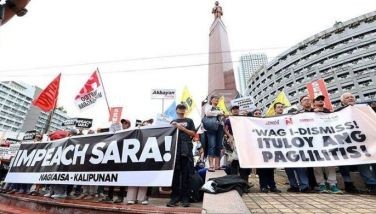FDIs: Uncomfortable preference on BPOs
The country, as a whole, is riding on a relatively steady growth this year. This is true, as major cities, like Metro Manila and Cebu, have become havens of FDIs. Notably, however, FDIs have been so focused only on business process outsourcing (BPO).
Remarkably, this development is confirmed by the country’s gross domestic product (GDP) make-up by sector last year. As reported, the agriculture sector contributed a measly 12.3%, the industry sector by a not so promising 33.3% and the services sector (where BPOs are lumped) by a huge but scary 54.4%.
Cautiously, while the contribution of the BPOs gives us a sense of fulfillment, the harsh realities can also be warily a source of discontent. For one, in our quest to attain inclusive growth, the BPO industry does not contribute so much. This industry employs not only the well educated but the best among them. Thus, though they claim to have boost taxi drivers’ income in a sense, they don’t directly give opportunities to individuals who are among the inadequately educated, the poorest of the poor, so to speak.
Secondly, this kind of investment (BPO) is just a rung higher than portfolio investments or “hot money”. Truth to tell, while they employ a lot, they don’t bring in huge investments for capital expenditures. They simply rent on IT-ready buildings and buy IT related equipment. So that, even at a loss of a major customer overseas, they won’t even bother look for another one, they simply leave and close. Worst, some of them may just even leave their employees to scavenge for whatever furniture, fixtures and equipment left in the office for their separation benefits.
Why are we getting FDIs that are so BPO focused isn’t difficult to decipher. These BPOs are mostly 100% foreign owned and by the nature of the business (export of services) is allowed by law to be such. Since they don’t need to construct manufacturing plants or factories but just rent offices, it suits them.
By the same token, FDIs that are geared towards manufacturing activities are hesitant. For one, they won’t pour in millions of investment and construct buildings on lots that they can’t own. As the law provides, they need to have partners in a 60:40-corporation and with them as minority to buy land. As the story has always been, they use dummies and, more often, end up in court for ownership battles. Consequently, they are discouraged and are discouraging other prospective investors to invest.
Thus, as far as FDIs that are geared towards manufacturing is concern, when weighed against that of other key cities in Asia, ours will surely pale in comparison. The main reason-the apparent lack of incentives (like, allowing them to own land). Despite these realities, however, our government has remained adamant in giving additional incentives to prospective foreign investors because, as they claimed, due to some nationalistic fervor.
This point of view is simply baloney. Having FDIs that are geared towards manufacturing bring about employment among the less educated and the poorest of the poor. There is absolutely no better nationalistic view than giving the poorest of the poor the chances to work and the opportunity to live and not merely exist.
Undeniably, however, the truth is put forward aptly by an Italian historian, Niccolo Machiavelli (1469-1527), when he said, “There is nothing more difficult to carry out, nor more doubtful of success, nor more dangerous to handle, than to initiate a new order of things. For the reformer has enemies in all those who profit by the old order, and only lukewarm defenders in all those who would profit by the new order, this lukewarmness arising partly from fear of their adversaries, who have the laws in their favour; and partly from the incredulity of mankind, who do not truly believe in anything new until they have had the actual experience of it.”
For your comments and suggestions, please email to foabalos@yahoo.com.
- Latest
- Trending























